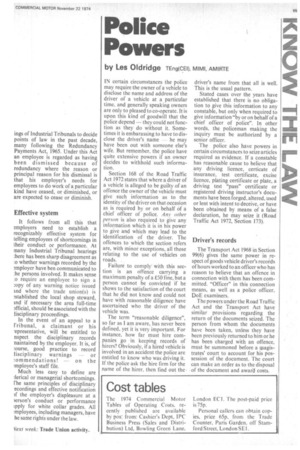Police Powers
Page 67

If you've noticed an error in this article please click here to report it so we can fix it.
by Les Oldridge TEng(C.EI), MIMI, AMIFITE IN certain circumstances the police may require the owner of a vehicle to disclose the name and address of the driver of a vehicle at a particular time, and generally speaking owners are only to pleased to co-operate. It is upon this kind of goodwill that the police depend — they could not function as they do without it. Sometimes it is embarassing to have to disclose the driver's name he may have been out with someone else's wife. But remember, the police have quite extensive powers if an owner decides to withhold such information.
Section 168 of the Road Traffic Act 1972 states that where a driver of a vehicle is alleged to be guilty of an offence the owner of the vehicle must give such information as to the identity of the driver on that occasion as is required by or on behalf of a chief officer of police. Any other person is also required to give any information which it is in his power to give and which may lead to the identification of the driver. The offences to which the section refers are, with minor exceptions, all those relating to the use of vehicles on roads. .
Failure to comply with this section is an offence carrying a maximum penalty of a £50 fine, but a person cannot be convicted if he shows to the satisfaction of the court that he did not know and could not have with reasonable diligence have ascertained who the driver of the vehicle was.
The term "reasonable diligence", so far as I am aware, has never been defined, yet it is very important. For instance, how far must hire companies go in keeping records of hirers? Obviously, if a hired vehicle is involved in an accident the police are entitled to know who was driving it. If the police ask the hire firm for the name of the hirer, then find out the driver's name from that all is well. This is the usual pattern.
Stated cases over the years have established that there is no obligation to give this information to any constable, but only when required to give information "by or on behalf of a chief officer of police". In other words, the policeman making the inquiry must be authorized by a senior officer.
The police also have powers in certain circumstances to seize articles required as evidence, If a constable has reasonable cause to believe that any driving licence, certicate of insurance, test certificate, excise licence, plating certificate or plate, a driving test "pass" certificate or registered driving instructor's documents have been forged, altered, used or lent with intent to deceive, or have been obtained by means of a false. declaration, he may seize it (Road Traffic Act 1972, Section 173).
Driver's records
The Transport Act 1968 in Section 99(6) gives the same power in respect of goods vehicle driver's records of hours worked to an officer who has reason to believe that an offence in connection with them has been committed. "Officer" in this connection means, as well as a police officer, DoE examiners.
The powers under the Road Traffic Act and the Transport Act have similar provisions regarding the return of the documents seized. The person from whom the documents have been taken, unless they have been previously returned to him or he has been charged with an offence, must be summoned before a Llaagistrates' court to account for his possession of the document. The court can make an order as to the disposal of the document and award costs.




















































































































